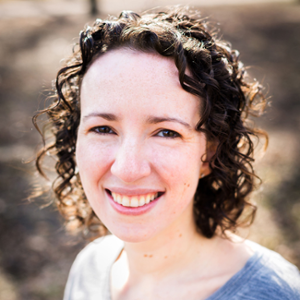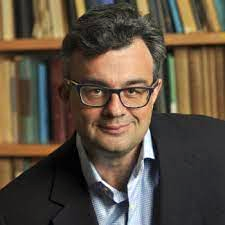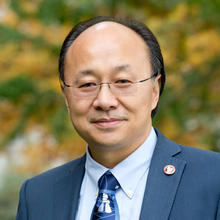Speakers
 Dr. Rina Barber - University of Chicago
Dr. Rina Barber - University of Chicago
Rina Barber is the Louis Block Professor of statistics at the University of Chicago. She completed her PhD in Statistics at the University of Chicago in 2012, and conducted postdoctoral research at Stanford University with Emmanuel Candes. Her research interests are in developing and analyzing estimation, inference, and optimization tools for structured high-dimensional data problems such as sparse regression, sparse nonparametric models, and low-rank models. She works on developing methods for false discovery rate control in settings where one may have under-sampled data or mis-specified models, and for distribution-free inference in settings where the data distribution is unknown. She also collaborates on modeling and optimization problems in image reconstruction for medical imaging. She won a Sloan Research Fellowship in 2016, and received the Tweedie New Researcher Award from the Institute of Mathematical Statistics in 2017. She was the recipients of the Peter Gavin Hall Early Career Prize, and the COPSS Presidents’ Award in 2020.
Dr. Emmanuel Candès - Stanford University
Emmanuel Candès is the Barnum-Simons Chair in Mathematics and Statistics at Stanford University, and Professor of Electrical Engineering (by courtesy). His research interests lie at the interface of mathematics, statistics, information theory, signal processing and scientific computing. He received his Ph.D. in statistics from Stanford University in 1998. Candès has received several awards including the Alan T. Waterman Award from NSF, which is the highest honor bestowed by NSF to early-career scientists, and the MacArthur Fellowship, popularly known as the ‘genius award’. He has given over 80 plenary lectures at major international conferences, not only in mathematics and statistics but in many other areas as well including biomedical imaging and solid-state physics. He was elected to the National Academy of Sciences and to the American Academy of Arts and Sciences in 2014.
 Dr. Michael I. Jordan - University of California, Berkley
Dr. Michael I. Jordan - University of California, Berkley
Michael I. Jordan is the Pehong Chen Distinguished Professor in the Department of Electrical Engineering and Computer Science and the Department of Statistics at the University of California, Berkeley. He received his Masters in Mathematics from Arizona State University, and earned his PhD in Cognitive Science in 1985 from the University of California, San Diego. He was a professor at MIT from 1988 to 1998. His research interests bridge the computational, statistical, cognitive, biological and social sciences. Prof. Jordan is a member of the National Academy of Sciences, a member of the National Academy of Engineering, a member of the American Academy of Arts and Sciences, and a Foreign Member of the Royal Society. He is a Fellow of the American Association for the Advancement of Science. He was a Plenary Lecturer at the International Congress of Mathematicians in 2018. He received the Ulf Grenander Prize from the American Mathematical Society in 2021, the IEEE John von Neumann Medal in 2020, the IJCAI Research Excellence Award in 2016, the David E. Rumelhart Prize in 2015, and the ACM/AAAI Allen Newell Award in 2009. He gave the Inaugural IMS Grace Wahba Lecture in 2022, the IMS Neyman Lecture in 2011, and an IMS Medallion Lecture in2004. He is a Fellow of the AAAI, ACM, ASA, CSS, IEEE, IMS, ISBA and SIAM.
In 2016, Prof. Jordan was named the "most influential computer scientist" worldwide in an article in Science, based on rankings from the Semantic Scholar search engine.
 Dr. Xiao-Li Meng - Harvard University
Dr. Xiao-Li Meng - Harvard University
Xiao-Li Meng, the Founding Editor-in-Chief of HDSR and the Whipple V. N. Jones Professor of Statistics, and the Founding Editor-in-Chief of Harvard Data Science Review, is well known for his depth and breadth in research, his innovation and passion in pedagogy, his vision and effectiveness in administration, as well as for his engaging and entertaining style as a speaker and writer. Meng was named the best statistician under the age of 40 by COPSS (Committee of Presidents of Statistical Societies) in 2001, and he is the recipient of numerous awards and honors for his more than 150 publications in at least a dozen theoretical and methodological areas, as well as in areas of pedagogy and professional development. In 2020, he was elected to the American Academy of Arts and Sciences. He has delivered more than 400 research presentations and public speeches on these topics, and he is the author of “The XL-Files," a thought-provoking and entertaining column in the IMS (Institute of Mathematical Statistics) Bulletin. His interests range from the theoretical foundations of statistical inferences (e.g., the interplay among Bayesian, Fiducial, and frequentist perspectives; frameworks for multi-source, multi-phase and multi- resolution inferences) to statistical methods and computation (e.g., posterior predictive p-value; EM algorithm; Markov chain Monte Carlo; bridge and path sampling) to applications in natural, social, and medical sciences and engineering (e.g., complex statistical modeling in astronomy and astrophysics, assessing disparity in mental health services, and quantifying statistical information in genetic studies). Meng received his BS in mathematics from Fudan University in 1982 and his PhD in statistics from Harvard in 1990. He was on the faculty of the University of Chicago from 1991 to 2001 before returning to Harvard, where he served as the Chair of the Department of Statistics (2004-2012) and the Dean of Graduate School of Arts and Sciences (2012-2017).